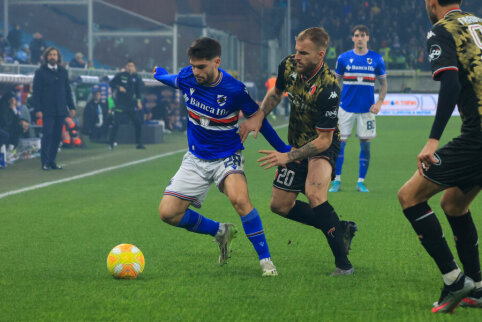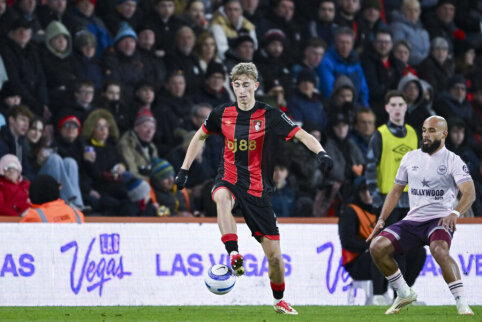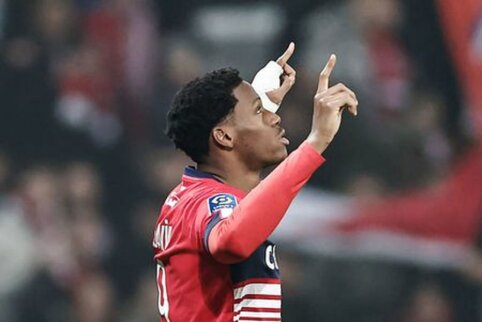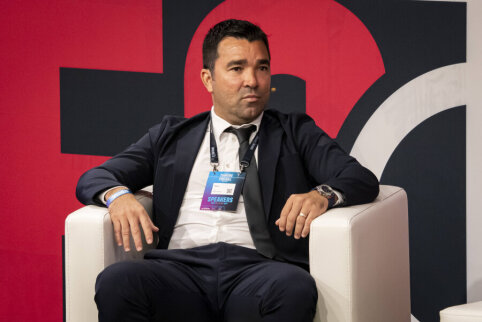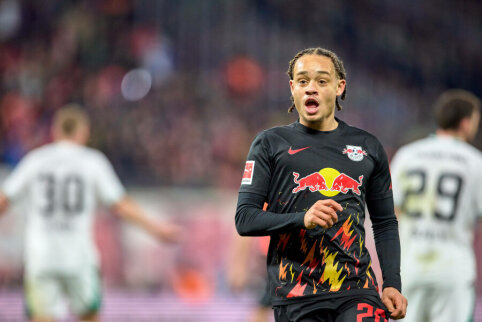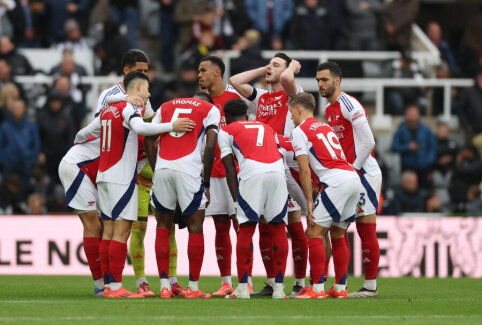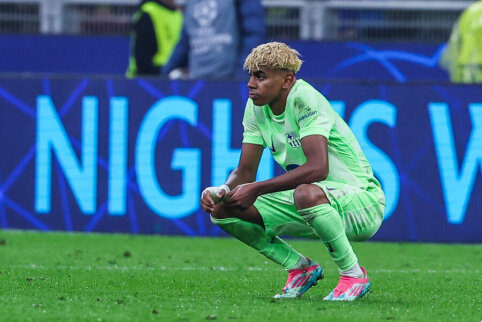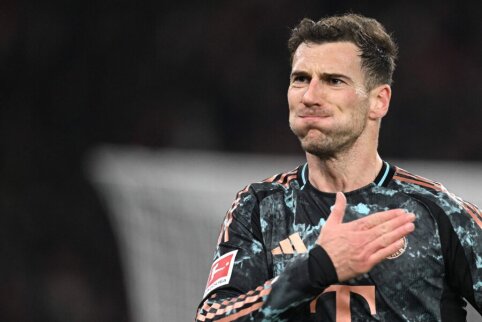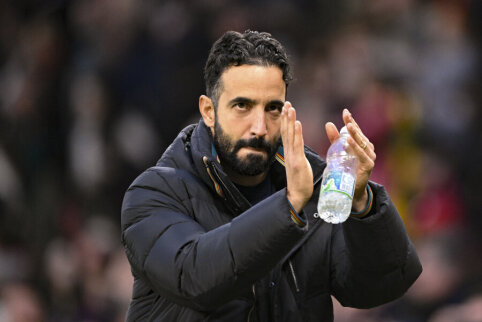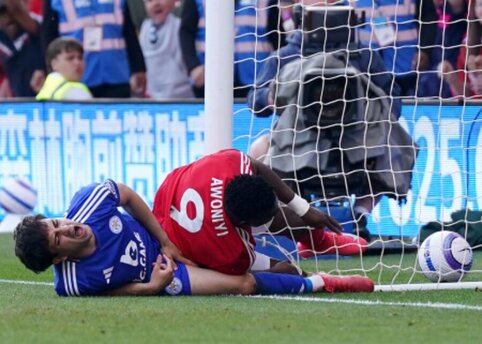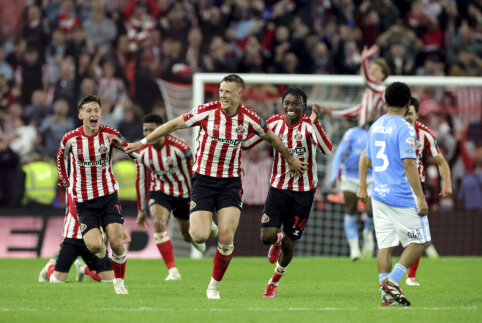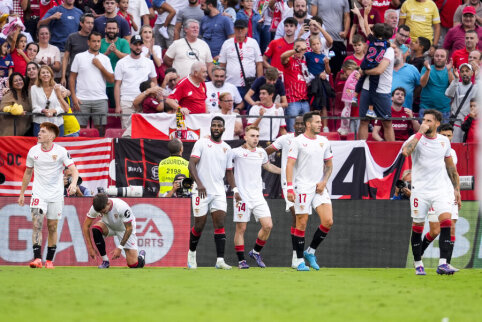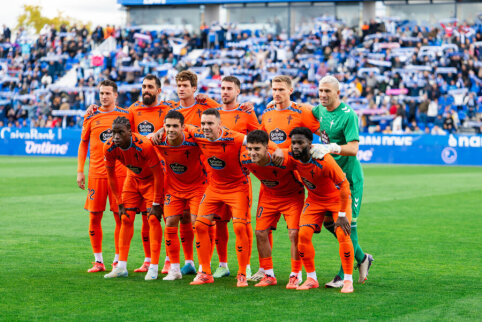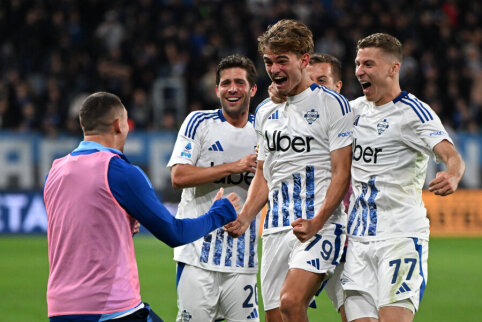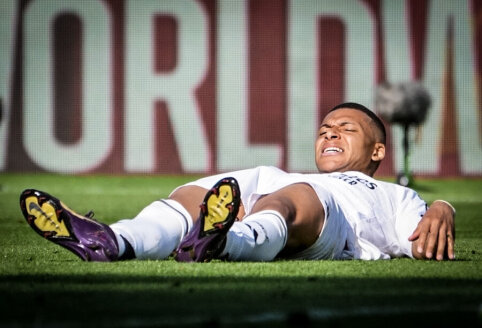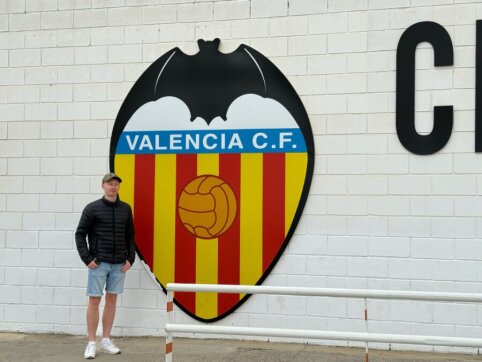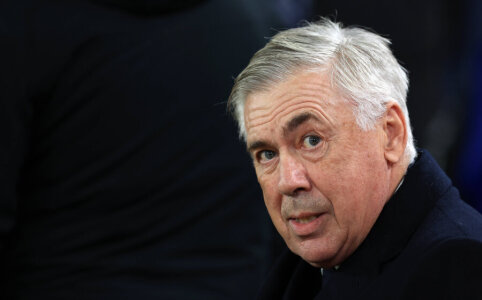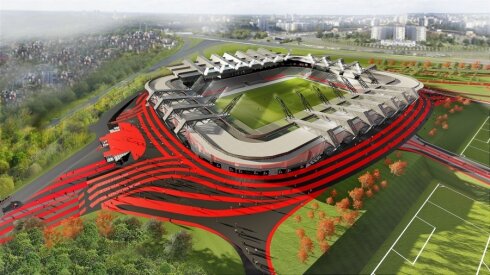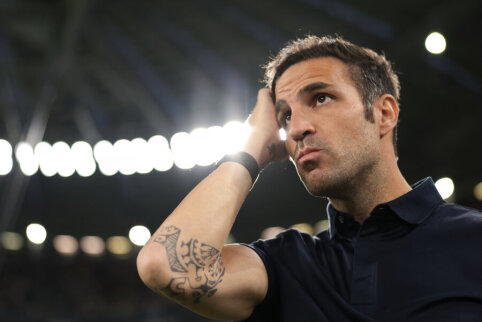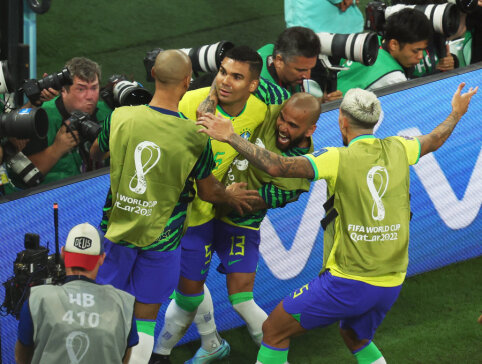 © EuroFootball.com
© EuroFootball.com
Augustinas Pakulis can boast of something that many "EuroFootball.com" visitors would probably envy - he is a certified football specialist who studied and completed his studies at one of the universities in Great Britain.
However, one of the founders of the Sunday Football League is not a coach. Augustinas is one of the first football marketing specialists in Lithuania, specializing not in instructions on how many passes to make in training, but in the analysis and presentation of football as a giant business phenomenon to the consumer.
In an exclusive interview with "EuroFootball.com," Pakulis talked about his studies in England, reviewed the current realities of football in Lithuania, and with a hint of regret admitted - he currently feels unnecessary in our country.
Studies biting not for everyone
- You are probably the only Lithuanian who has completed football-related studies in England. What did you study there?
- This year I completed my bachelor's studies at the University of Southampton and received a diploma in football management.
- I studied a lot of things - sports management and psychology, marketing, as well as the specifics of football training. Many think that these studies are like coaching courses - you come and work in training. However, the main aspect of my studies was academic work, writing essays.
- The learning process was intense, especially in the last year. At the beginning of the studies, there were more than 70 students, but for one reason or another, only 38 graduated. The fact speaks for itself. I had to go without sleep for a couple of weeks to catch up with everything - sometimes even doubts arose whether I would succeed.
- Three Latvians studied with me. Two of them failed to defend their final projects, so they had to work in the summer. I, thank God, managed to avoid that.
- From the story, we can understand that you are much more of a football marketing specialist rather than a coach.
- Yes, the science was about presenting football as a product. Never say never - maybe I will have to work as a coach, especially since I obtained a second level coaching qualification. I could continue my studies in Lithuania, but I am more interested in football from the marketing side. Because in our country, there are really good coaches, but there is definitely a need for activity on the marketing side.
- What was the topic of your bachelor's thesis?
- As soon as I arrived in England, I told everyone that I was not going to stay here. I wanted to gain knowledge about football and try to apply it to raising the level of football in Lithuania. The professors assigned topics for all the students' final projects, but for this reason, they allowed me to choose more freely.
- Many wrote about the English football leagues, fan relationships, and I wrote about why football in Lithuania is not as popular as basketball. I compared these two sports, their advantages and disadvantages from various perspectives.
- The work, which was about 75 pages long, was made easier by the fact that last summer I did an internship at the Lithuanian Football Federation. In preparing the football strategy, I gained a lot of knowledge that I could use in my work, and it was well appreciated.
- What did you do during your internship in Lithuania?
- My job was related to the creation of the Lithuanian football strategy for 2010-2020. We analyzed what was needed for football to become the most popular leisure activity by 2020. We invited many foreign guests who consulted, explained what the infrastructure should be like for football to develop, and gave advice on how to develop the "A league" championship.
- I went straight from work at the federation to the airport and flew out to finish the last third year of studies at Southampton. I don't know how the strategy was completed, as I did not have time to see it, but from what I heard, it was prepared for two or four years ahead.
- In England, you said that you are only temporarily staying here and will return to your Homeland. What determined such determination - patriotism, homesickness, employment problems in England?
- There were opportunities in England, even certain offers for the best students. However, Lithuania always attracted me as my native land. I am not particularly patriotic, if I had received good financial offers, I might have stayed in England.
- On the other hand, there were certain promises in Lithuania. But promises remained mere promises. I do not argue with that - it is what it is. One must live, one must work, and perhaps things will change in the future.
- And with a diploma in hand, the path is not strewn with roses
- How does a career start after completing these studies?
- Everything depends on how you view the studies. If you work hard, you will succeed. The second thing is that you must do something alongside your studies. Just graduating well is not enough.
- Football in England is such an area that those who want to stay in the country need to work hard on their own. Just completing studies and doing nothing alongside them is difficult even for the English. Out of almost 40 people who completed their bachelor's studies with me, only five or six work in football. The others either cannot find a job or engage in activities in other areas.
- It also depends on what jobs interest you. There are several people who went to work in the second division clubs in England, one even got into the reserve team of London's "Fulham" in the Premier League. Of course, he would probably not have gotten the job without certain connections.
- Has your view of football, of what happens on the field during a match, changed after completing your studies?
- Yes, and not just what happens on the field. From the first day at university, we were told - you came here to study, so you have to forget about "pub football watching." You can no longer watch matches with friends while having a beer. I am not just talking about the matches themselves, tactics or the like, but also about football as a sport.
- Formerly football was a game for the people, but now it is also a huge business involving billions. From the second year of studies to the end, we learned about marketing - how this business is created, what football globalization is, what models exist. There is a wealth of literature on this.
- In Lithuania, it is thought that if we win, we will enter some championship, football will immediately jump to the top. But that's not true. Latvians made it to the European Championship, and one club played in the group stage of the Europa League. And then what? It's not just about the results. Football consists of many little details - results, working with the community, money, infrastructure.
- Of course, we learned mainly using the example of the Premier League. We cannot apply the models used in Lithuania to the "A league" because historically, football has always been number 1 there. However, there are certain things that can be implemented.
- After completing your studies, you returned to Lithuania... What are the prospects, what offers did you receive?
- It's hard to say. I'm not claiming that I feel deceived, but there were certain promises. I don't feel needed for Lithuanian football. This does not mean that it will always be like this - I can wait, that's probably what I should do. I'm not complaining - I have a lot of work, but I would like to help football more. If needed, I will be ready to help, but I won't beg.
- Upon my return, I sent my CV to the Marijampolė "Sūduva," Vilnius "Žalgiris," Panevėžys "Ekras" clubs. And currently, I work as a producer at "Sport1" television.
- From whom did you receive promises - from the federation or the clubs?
- It is as it is. It was different a year ago. I don't know the reasons why something changed, as they can be objective or not. It's not for me to decide. I only know the fact - I don't have a job in football, although I would like to.
- I emphasize - I do not support any side in any conflicts. This harms the sport itself, not just one organization. Divisions, confrontations are harmful. But one has to live from something. Of the options I had, which were not many, working in television turned out to be the best. I work here not to support one side or the other.
Sunday Football League - an example for others
- You are one of the creators of the Sunday Football League...
- Currently, I am the project manager for the SFL. It is probably the best football project in Lithuania, which started from scratch. And now we have a lot of teams, fans, as well as famous sponsors - the facts speak for themselves. It's a long job, but the result is achievable - the federation, clubs have a lot to learn from us.
- In addition, we started the gymnasium championship; there are big plans with the SFL. I think over time, the SFL will be all over Lithuania, not just a football product. So I am not standing still - there is work, there are plans, even though I would like to work in my field.
- What is the history of the SFL - where did it all start, what difficulties did you have?
- There are always difficulties, but there were no particularly significant ones. Everything was improvisational - "Prelegentai," I, Paulius Malžinskas, who is now the league president, and the then "Mažosios Statybos" club, met in Kalnų park and decided to organize amateur championships. There were no grandiose plans at the beginning - we formed two groups of six teams each, and as time went on, everything evolved into a championship that takes place in three regions in Lithuania and combines Lithuanian cities. We have more than 2,500 players, it's a joy that we managed to grow in this way.
- The SFL does not just take place on weekends - we play football all year round. In addition, there is the gymnasium championship - of the 20 Vilnius gymnasiums, 18 participate. LFF has the "Ežiogolo" project for children, and we held a tournament for high school students because they also need somewhere to let out energy. We awarded prizes to those who write news, provide interesting coverage of the tourneys - this way, we promote journalistic work.
- Constantly emphasized in Lithuania that we do not have suitable fields for amateurs, let alone professionals.
- The dream of the SFL is to have its artificial turf field. The lack of fields is felt, but we cannot expect it to be like in England - a field on every corner. I think if we make the most of what we have, we can successfully play and share - it just takes the desire.
- Take the example of high schools - some schools and students have taken care of their stadiums, cutting the grass, buying nets for the goals. SFL clubs with their rented stadiums also take care of them, mow the grass, and so on. SFL contributes as much as it can, so the number of fields is growing. The federation also works on this issue, constantly building fields, but it is not easy to do it in every region. After all, it is more expensive to install a football field than a basketball court.
Lithuanian football realities - glimpses overshadowed by talk of opacity
- Are LFF's expectations realistic to make football the most popular leisure activity?
- That is the mission of LFF - to popularize football in Lithuania. How much they can achieve this depends on many factors, and time will tell. In the right direction, especially with the exceptional football club licensing process and the development of grassroots football. In my opinion, this is the right approach - clubs must manage themselves, stadiums must be built or renovated, and the federation plays a significant role in this. However, it is undoubtedly not easy.
- You are a football marketing specialist. What problems do you see in Lithuania, what things make you happy?
- The licensing process is commendable. Clubs are getting organized, stadiums are being built, and renovated - this is a positive development. There is enlightenment, but the biggest drawback is that football in Lithuania is overshadowed. It is not good for the sport if it lacks transparency. It is announced that the fields are being maintained, the national team has ambitions to enter the European Championship, but the transparency from clubs and the federation is lacking.
- It must be explained what the federation is. It is necessary to talk not only about what it does but also about what kind of organization it is. It is too closed. Of course, there are many good people there, but communication needs to be better.
- The same goes for clubs - they need to communicate with the public. "Ekranas" does this, "Žalgiris" has started, to some extent "Sūduva," Gargždai "Banga," but the others do not work on that. There is a club that plays matches on weekends and that's the end of it. There needs to be events organized around the federation and the club, like what basketball players do. They go to hospitals, orphanages, national team commercials are made - and this creates an image. For some reason, football avoids that.
- Influential millionaire Vladimir Romanov once said: "The A league" - the betting league. Isn't this a huge blow to the prestige of the championship?
- I don't want to comment on betting - the representatives of the federation or Mr. Romanov know more about that. But it is almost talked about everywhere - in Lithuania, Latvia, Russia, Italy, Spain. I can only say that, in my opinion, these conflicts harm sport, harm football. Conflict between certain federations and business representatives does not adorn football.
- I don't know how much truth there is in the speeches, but just the fact that it is brought to the public is bad for the sport. It must be transparent. After all, there is a huge anti-advertisement being done because a person who is not overly interested in football just has to read a few articles about such machinations, and he will find football uninteresting and corrupt.
